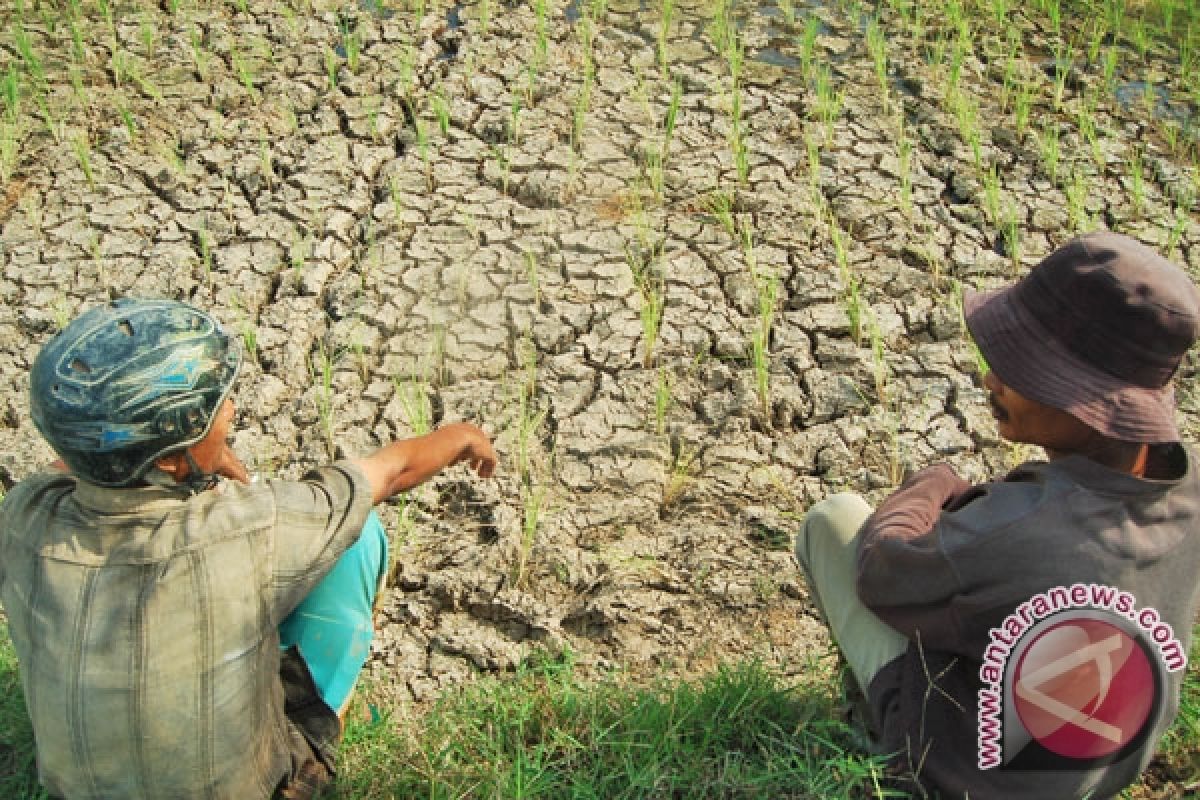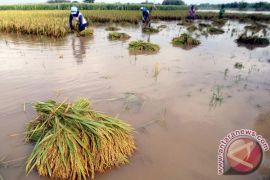"We plan to provide aid of up to Rp3.7 million per hectare of rice field..."Jakarta (ANTARA News) - It is currently estimated that the drought, which has hit nine provinces in Indonesia, will affect at least 127,000 hectares of rice fields, of which around 3,000 hectares have failed to produce a harvest this year.
However, on a national scale, the impact of the drought on the country's total rice production has been relatively insignificant because the affected 127,000 hectares of rice fields only account for around 1.2 percent of the country`s total crop fields, which cover around 10.5 million hectares and on an average have an annual production of around 38 million tons.
But farmers, whose crop has been affected by the drought, stand to incur great losses. As a result, the government plans to make certain efforts to help reduce the impact of the drought and relieve the farmers of their burden.
The government, through the Ministry of Agriculture has set aside a fund of Rp199 billion, which will be distributed directly to the farmers whose rice fields have failed to produce a harvest on account of the dry spell.
Agriculture Minister Suswono stated that the funds will be handed over directly to farmer groups to prevent illegal cuts and levies.
"We plan to provide aid of up to Rp3.7 million per hectare of rice field for farm cultivation and fertilizers that will help in preventing harvest failures," Suswono said on Wednesday.
He also pointed out that the Rp199 billion in funds is expected to cover at least the losses of farmers who own the drought-affected 65,000 hectares of rice fields.
Suswono's deputy minister also agreed. "The funds will be distributed as compensation to the farmers who have been severely affected by the drought and this will give them a chance to cultivate their land again," Deputy Minister for Agriculture Rusman Heryawan stated after attending an event to mark a rice harvest in the Bantul district of Yogyakarta on Wednesday.
He added that the amount of compensation can be raised if necessary, as this is an urgent matter.
"The funds will be provided directly to the farmers, but a team will first verify the extent of crop damage, which should be at least 75 percent or more if a farmer has to qualify for compensation," the deputy minister noted.
Heryawan said that based on the latest data received, a total of 125,000 hectares of rice fields are currently facing harvesting failure, locally known as `puso, and the government will make the necessary efforts to prevent this.
"Drought has affected the productivity of over 125,000 hectares of land, mostly in Java," he said.
Heryawan stated that at least 3,000 hectares of rice fields in West Java have been declared `puso, and in order to prevent this from happening in other agricultural lands, the Ministry of Agriculture has formed a team, which will be in charge of monitoring drought affected areas so that the government can take the required remedial steps when needed.
The drought-hit nine provinces include Lampung, Banten, West Java, Central Java, Yogyakarta, East Java, West Nusa Tenggara (NTB), East Nusa Tenggara (NTT) and West Papua.
As these regions are repeatedly hit by drought every year, the government is making special efforts this year to mitigate the impact of the drought on harvesting, compared with previous years.
Besides providing compensation to farmers, the government is also provisioning water tanks, water pumps, water wells and artificial rain for them to help cope with the shortage in water supplies for both irrigation and human consumption.
The government is also working on a plan that will help overcome the annual drought impact in the years to come. Minister Suswono pointed out that the government has allocated Rp3 trillion towards repairing irrigation facilities across the country by 2014, given that around 52 percent of irrigation facilities in Indonesia do not function properly.
However, a total of Rp21 trillion is needed by the Ministry of Public Works and the Ministry of Agriculture to fix the irrigation system nationwide, he added.
The government has planned to develop and implement programmes that will minimize the impact of the drought on the nation's agricultural land.
"We will also prepare a list of the areas affected by the drought, so that we can take preventive measures to save those fields," Suswono added.
The government has been praised for its prompt action in mitigating the impact of the current dry spell. "The attention shown by the Agriculture Ministry deserves high appreciation," Leta Rafael Levis, an agribusiness observer from the University of Nusa Cendana in East Nusa Tenggara (NTT) stated on Thursday.
He noted that the government took speedy action through two institutions, namely the Ministry of Agriculture and the National Disaster Controlling Agency (BNPB).
The BNPB has already concluded an intensive action plan to deal with the drought, by giving priority to nine provinces, which include Lampung, Banten, West Java, Central Java, Yogyakarta, East Java, West Nusa Tenggara (NTB), East Nusa Tenggara (NTT) and West Papua.
Levis, who also teaches at the Nusa Cendana University, pointed out that the government can provide additional water supplies through water tanks, water pumps, water wells, artificial rain and through the construction of reservoirs and by distributing water on a rotational basis.
He noted that the government needs to construct at least 1,500 reservoirs along the upstream and downstream river basin areas. A labor intensive system, it will involve the local people, the BNPB, agricultural services and the public works services.
Levis stated that even though the actions taken by the government are only aimed at coping with the effects of the drought, rather than prevent the impact of the annual dry spell, the government still deserves appreciation.
He also warned that shortages in fresh water supplies will be a problem worldwide in this century and that by 2050, at least two third of the world's population will face water shortages.
Since 1995, the provinces of Java, Bali and Nusa Tenggara have suffered from a deficit in water supply every year owing to the dry season, Levis said.
These provinces face a water deficit during seven months of the dry season and a surplus is only seen during the remaining five months of the rainy season, he added.
(T.A014/INE/KR-BSR/B003)
Reporter: by Andi Abdussalam
Editor: Priyambodo RH
Copyright © ANTARA 2012










